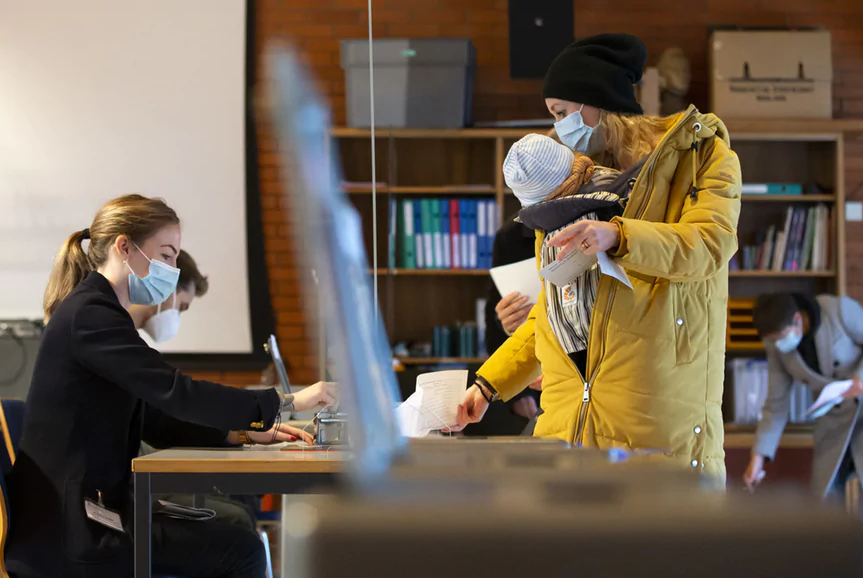The Swiss government has started to cautiously lift several Covid restrictions put in place in mid-January to reduce infection levels. Shops, museums and sports facilities re-opened from March 1 but restaurants and bars remain closed. Keystone / Jean-christophe Bott After a weak start to the year, Switzerland’s economy should recover rapidly from a heavy coronavirus-driven slump to grow by 3% in 2021, the government said on Thursday. Gross domestic product will fall “significantly” in the first quarter of this year, after Covid-19 restrictions last December, the State Secretariat for Economic Affairs (Seco) said in a statementExternal link. But the economic situation should pick up quickly if the pandemic situation in Switzerland evolves positively. “Should the
Topics:
Swissinfo.ch considers the following as important: 3.) Swissinfo Business and Economy, 3) Swiss Markets and News, Business, Featured, newsletter
This could be interesting, too:
Nachrichten Ticker - www.finanzen.ch writes Die Performance der Kryptowährungen in KW 9: Das hat sich bei Bitcoin, Ether & Co. getan
Nachrichten Ticker - www.finanzen.ch writes Wer verbirgt sich hinter der Ethereum-Technologie?
Martin Hartmann writes Eine Analyse nach den Lehren von Milton Friedman
Marc Chandler writes March 2025 Monthly

The Swiss government has started to cautiously lift several Covid restrictions put in place in mid-January to reduce infection levels. Shops, museums and sports facilities re-opened from March 1 but restaurants and bars remain closed. Keystone / Jean-christophe Bott
After a weak start to the year, Switzerland’s economy should recover rapidly from a heavy coronavirus-driven slump to grow by 3% in 2021, the government said on Thursday.
Gross domestic product will fall “significantly” in the first quarter of this year, after Covid-19 restrictions last December, the State Secretariat for Economic Affairs (Seco) said in a statementExternal link.
But the economic situation should pick up quickly if the pandemic situation in Switzerland evolves positively.
“Should the epidemiological development allow the gradual easing of coronavirus measures as intended, the domestic economy should recover very quickly,” Seco said.
“Various consumer opportunities that were largely unavailable in the winter months would re-emerge and lead to turnover rising again in the affected sectors. At the same time, growing global demand is set to boost exports.”
Unemployment is predicted to fall gradually and reach an annual average of 3.3 % for 2021.
Switzerland’s economy shrank 2.9% last year as a result of Covid-19, the worst annual contraction since the aftermath of the oil crisis in 1975. But official figures showed that the second wave in the autumn had a less harmful effect, with the economy growing 7.6% in the third quarter before slowing to +0.3% in the last three months of the year.
Easing restrictions
The government has started to cautiously lift several Covid restrictions put in place in mid-January to reduce infection levels. Shops, museums and sports facilities re-opened from March 1 but restaurants and bars remain closed. Additional steps are expected on March 22 if the course of the pandemic allows.
But the government has difficult decisions ahead. After slowing, then stagnating for two weeks, the number of new daily infections has started to rise again, Virginie Masserey of the Federal Office of Public Health (FOPH) told reporters on March 9. “The situation remains uncertain,” she stressed.
If the Swiss economy recovers in 2021 – in line with Seco’s December forecast – it will return to pre-crisis levels towards the end of the year. For 2022 Seco expects the economy to grow by 3.3%, up from its December forecast for a 3.1% increase.
But the government office warns of potential risks ahead.
“The recovery would be noticeably delayed if in the coming months further strict containment measures were to be introduced domestically and by key trade partners, for example due to backlogs in the coronavirus vaccination programmes,” it said.
And the pandemic may continue to affect economic development into 2022 via the spread of coronavirus mutations against which the existing vaccines are less effective, it added.
Tags: Business,Featured,newsletter








